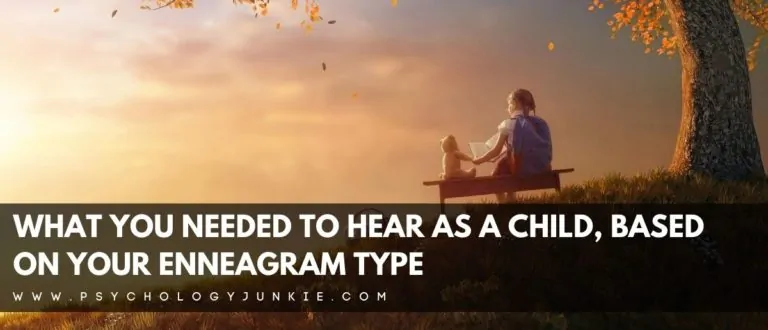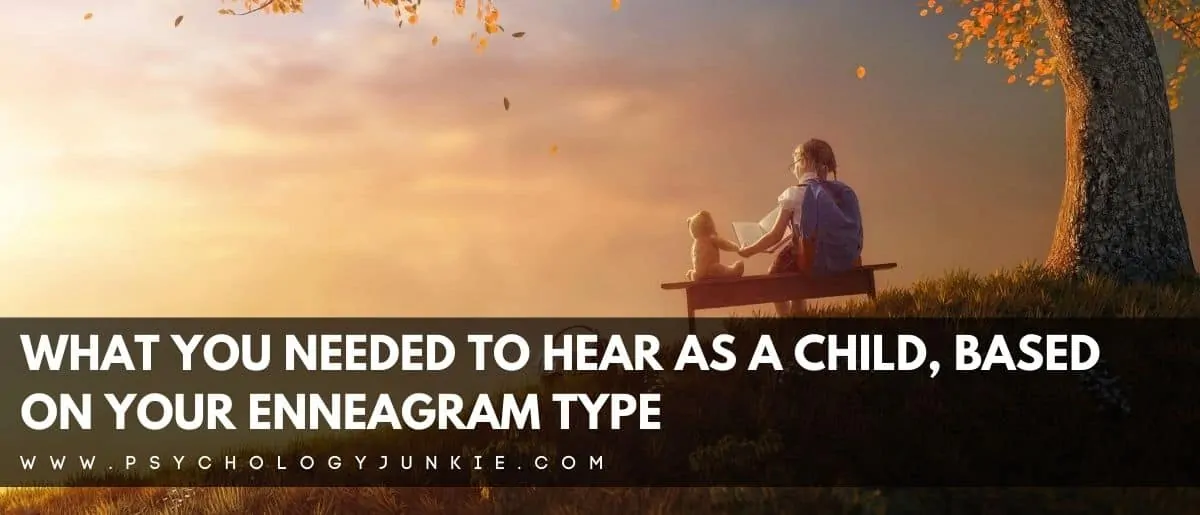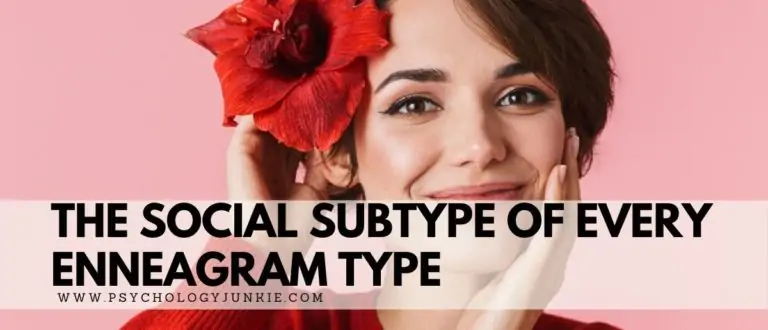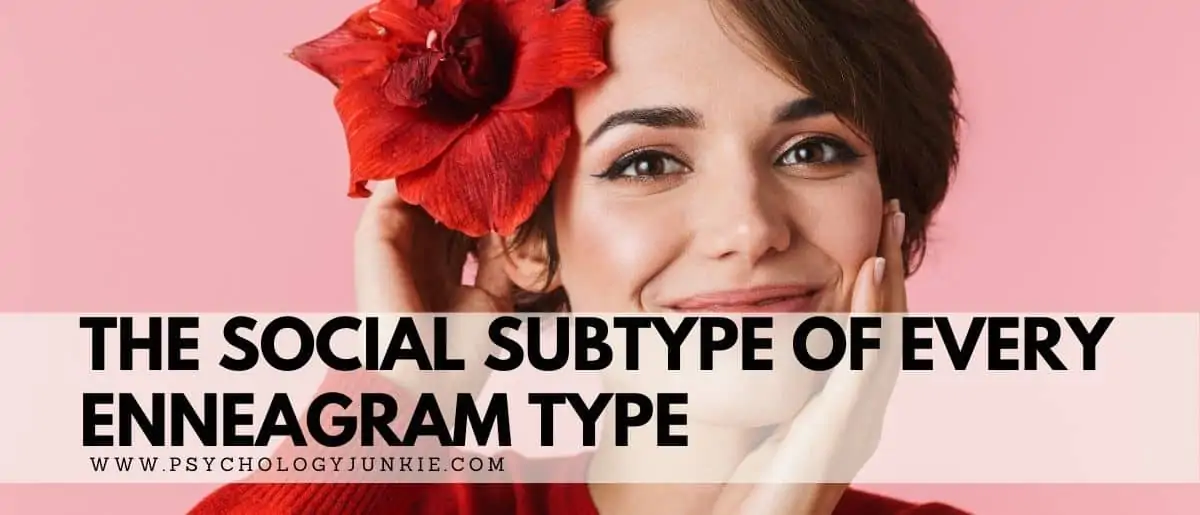Your Relationship Triggers (and How to Cope), Based On Your Enneagram Type
Do you ever feel like the things that really make you mad in a relationship are completely different than what triggers anger in your partner? Do you ever feel trapped, stiffled, stressed, put upon, ignored, or taken advantage of? What is triggering these feelings?
Today I want to take a look at all of these anger-inducing feelings through the lens of the Enneagram. The Enneagram gives us a glimpse into our deepest emotional triggers, helps us see what we want, what we fear, and what makes our skin crawl with irritation. Let’s explore what sets off each Enneagram type and how we can manage these feelings constructively.

Not sure what your Enneagram type is? Take our free questionnaire here
Your Relationship Triggers (and How to Cope), Based On Your Enneagram Type
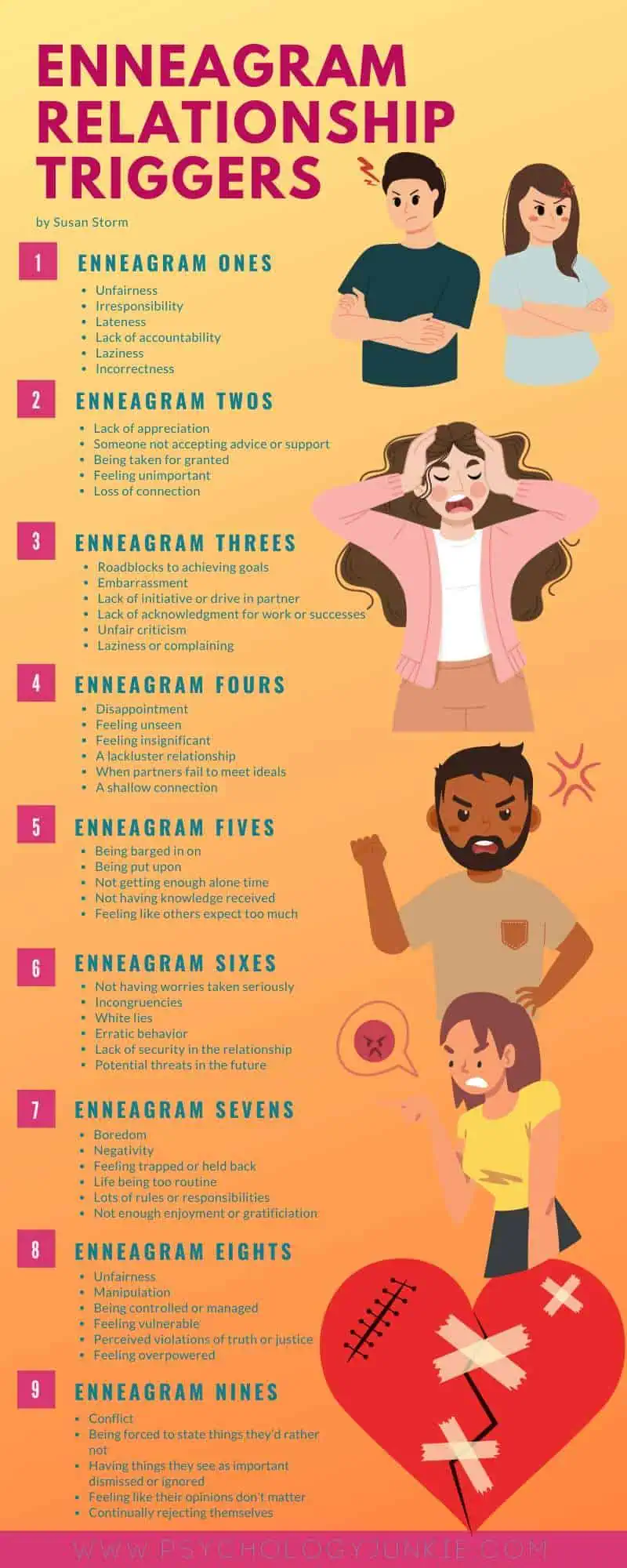
Table of contents
- Your Relationship Triggers (and How to Cope), Based On Your Enneagram Type
- Enneagram 1 – The Perfectionist
- Enneagram 2 – The Helper
- Enneagram 3 – The Achiever
- Enneagram 4 – The Individualist
- Enneagram 5 – The Investigator
- Enneagram 6 – The Loyalist
- Enneagram 7 – The Enthusiast
- Enneagram 8 – The Challenger
- Enneagram 9 – The Peacemaker
- What Do You Think?
Estimated reading time: 20 minutes
Enneagram 1 – The Perfectionist
Triggers
- Unfairness
- Lack of accountability
- Irresponsibility
How It Feels
- Tension, erectness, tightness
- Suppressed anger, resentment
Deeper Insight
For you, integrity is the most important thing in any person or relationship. When you face perceived unfairness or irresponsibility, your inner critic goes into overdrive. Your fists clench, your jaw tightens, you inhale and hold your breath, trying to contain your pent-up frustration or rage. You feel overwhelmed by the idea that everything has been left up to you, that you are separated from your partner because of the differences in correctness, responsibility, or “right”ness.
In your mind, you are superior, they are inferior. Rather than being open and accepting, you feel rigid, constricted, tense, and judgmental. Why can’t they just do their part? Why can’t they just see what’s obviously wrong in their lifestyle or decisions?
As a One, you are always putting pressure on yourself to be right and good, above reproach. You spend your life trying to be perfect, to check every box, so that no one can ever point the finger at you and say “you failed.” But with this inner critic directed at you, you also tend to point the finger at others, seeing the ways they have failed to live up to your expectations. You can’t fathom how they can go through life without the same feeling you have of needing to be perfect at all times.
Self-Care Tip
Examine the ways you are hard on yourself and ask yourself whether it is actually good for you. You care about being good and right; so are you being good and right and fair to yourself? Is it fair to expect or demand perfection of yourself and others? Is it fair and good and right to be tense, overworked, and self-critical?
Practice acceptance, breathing, and letting go. Take time to acknowledge your flaws without judgment, and extend that same understanding to those around you. This is a huge task and one that I’m fully aware can’t be summed up and immediately put into practice right away with perfect efficacy. But just a little time working on this consistently can make big differences in your overall well-being.
When you are feeling betrayed, it’s important to express your thoughts and feelings. But first take time to decide whether what you’re judging are actual errors or simply differences in perspective. Recognize your inner judge and whether it is in or out of line.
Find out more about Ones: Escaping the Trap of Resentment for Ones
Enneagram 2 – The Helper
Triggers
- Lack of appreciation
- Obstacles when you “know what’s best”
- Loss of connection
How It Feels
- Tightness and anxiety in your chest
- Anxiety, neediness
- A feeling of being unappreciated
Deeper Insight
As a Helper, your core desire is to be loved and appreciated. And for many Twos, being indispensable is key. You want to be needed; incomparable in your ability to help and offer guidance and love. You want to be “the one” that others turn to for guidance, love, support, and affection. Simultaneously, you hope they will do the same for you without having to be asked.
When others do not acknowledge your efforts or when your help is rejected, it feels like a personal blow. This lack of appreciation can create tightness and anxiety in your chest as you feel an overwhelming need to prove your worth. Pride, one of the vices of the Two, can show up in the feeling that you are superior and the other person is inferior in the relationship.
During moments like this, you might call out behavior that you see as selfish or unappreciative. After all, you have done so much for the person and have been so generous! You have always felt burdened with this need to fulfill others’ needs, and now they’re not letting you, or worse, they’re not even seeing or acknowledging your efforts.
When you encounter obstacles while trying to help others, especially when you believe you know what’s best for them, it can trigger frustration and a sense of helplessness. This is followed by a feeling of loss and a desperate need to reconnect.
Self-Care Tip
Understand that your worth is not solely dependent on the approval of others. Practice self-love and acknowledge your own value and contributions independently of external validation. Practice saying ‘No’, not just to others but to yourself when you feel compelled to overburden yourself and give in hopes of getting something back.
I know it’s easy to spout off these self-care tips that I’m sure many of you have heard before. It’s harder to actually do them. As a Two, your modus operandi is to say ‘Yes’, to give of your time, to support, to seek out connection. It’s much harder to say ‘No’, to look inward and assess your motivations, to look for a sense of worth outside of what you give. But even small, consistent efforts here can make huge differences in your overall happiness in a relationship.
Establish healthy boundaries and recognize that sometimes, stepping back can be just as beneficial as stepping in. Learn to listen and respect others’ wishes and space. It can be hard at first, but with mindfulness and patience you can grow. In moments of anxiety and tightness, focus on grounding techniques like deep breathing, meditation, or even journaling to center yourself and alleviate the buildup of stress or anxiety.
Discover More About Twos: Escaping the Trap of Flattery for Enneagram 2s
Enneagram 3 – The Achiever
Triggers
- Obstacles in achieving tasks or goals
- Lack of approval or admiration
- Image issues
How It Feels
- Angst and impatience in the chest
- Racing heart, distress
- Feeling of unapproved-of-ness
Deeper Insight
As an Achiever, your core drive is to be successful and seen positively by others. You place a high value on achievements and the admiration that comes with them, equating your worth with your accomplishments. When you face obstacles in achieving your goals, it triggers deep feelings of distress and impatience. Your heart starts to race, you begin to worry that everything will fall apart, that you’ll fail, lose, that your worth will never be achieved.
Similarly, when approval or admiration from others is lacking, you feel a profound sense of unworthiness. Image issues also strike you hard; you always want to appear polished, competent, ready for anything. These triggers lead to physical manifestations like a racing heart and distress, further fueling your anxiety.
In these moments, the feeling of being unapproved of or unnoticed can overwhelm you. This often pushes you to work even harder, driven by the false belief that your value is tied solely to your success and others’ perceptions of you. You feel you “cannot fail”, and that you must avoid any wrinkle in your perfect image at all costs. In relationships, this can mean that you’re triggered by people who get in the way of your goals, fail to notice your achievements, or who criticize you in any way.
Self-Care Tip
Allow yourself to slow down, become more receptive, and mindful. Recognize that the feeling of being unacceptable without success is false. Practice letting go of the way you feel you need others to respond to you. Allow yourself to let go and “be” rather than to simply “do.” Notice your peace, what gives you a sense of calm, and infuse every day with more of that. It might seem impractical sometimes (your to-do list is overflowing!), but it’s key to not getting overwhelmed and frustrated in your life and relationships.
Practice deep breathing and mindfulness techniques to release the need for constant validation and external approval. It’s important to take time for self-reflection, acknowledging your inherent worth apart from your achievements. Establish a balance between striving for success and appreciating the present moment, and focus on forming deep, authentic connections that go beyond surface-level admiration.
Find Out More About Threes: Escaping the Trap of Vanity for Enneagram 3s
Enneagram 4 – The Individualist
Triggers
- Disappointment
- Feeling unheard, unimportant, unseen
How It Feels
- Unbearable disappointment, heartache
- Sick feeling in the stomach
- Spiral into inferiority and anguish
Deeper Insight
You are sensitive to emotional nuances. Feelings of being overlooked or unimportant can spiral into deep disappointment and heartache. As an Individualist, you consistently strive to find that ideal love or situation, one in which you feel truly ‘Seen.’ You have a deep-seated need to be extraordinary, to avoid mediocrity at all costs. Your life is probably a constant quest for uniqueness and purpose, trying to find something intense and extraordinary. But this drive can sometimes come with a heavy toll.
An ‘average’ relationship can feel unfulfilling and mundane. There are times you feel like all the nuance and intensity of who you are is invisible to the people you care most about. Maybe life has become more about going through the motions than exploring something intense, extraordinary, and profound. Perhaps you feel like your partner doesn’t see you for who you really are, or is content with a lifestyle that is too ‘cookie cutter’ for you.
You can also struggle with comparisons—always seeing yourself as ‘less than’ others, no matter how much you achieve or how unique you become. It’s exhausting to measure your worth against others’ successes and feel that you somehow come up short. You might find yourself always expecting others to have the same intense ideals as you do, and when they don’t, it leads to profound disappointment.
Self-Care Tip
Being present in the moment is one of the most important things for any relationship. Do you spend all your time comparing, contrasting, idealizing, imagining? While imagination and high ideals can be a very positive thing, it can pull you away from the beauty and richness of the moment at times.
Invite yourself to slow down, breathe, and ground yourself in the present moment. Practice radical self-acceptance, recognizing and appreciating your unique qualities without comparison to others. Let go of the ‘ideals’ or imagined version of yourself. Focus on who you really are, right now.
Look at your relationship objectively. Ask yourself if the dissatisfaction you’re feeling is due to genuine issues or if you are setting unattainably high standards for your partner. Just as you compare yourself negatively to others, you might also be holding unfair comparisons for your partner, which can create a cycle where they never seem ‘enough.’ Think about whether you are idealizing what a perfect partner should be and how that could be affecting your relationship. To get help with this, try talking openly with your partner about your feelings without placing blame.
Find Out More About Fours: The Enneagram 4 Individualist
Enneagram 5 – The Investigator
Triggers
- Invasions of privacy or independence
- Emotional demands from others
- Someone being disinterested in your knowledge
How It Feels
- Overwhelming need to detach
- Compulsion to withhold affection, time, attention
- Feeling of shrinking into oneself
Deeper Insight
As an Investigator, you crave independence and have a high need for personal space. When people impede on your space or time, you might feel an urgency to withdraw. When you feel people crowding in on you, you get an overwhelming urge to detach, both emotionally and physically, from the situation or person responsible. Your desire to protect your inner world can look like withholding affection, time, and attention from those around you, especially when they place emotional demands on you that feel excessive or intrusive.
Alternatively, when others seem disinterested in your knowledge, you can feel insulted or disappointed. This can cause you to retreat even further from people, taking comfort in data-gathering versus emotional connection. The irony is that this self-imposed isolation, while meant to safeguard your internal resources, can amplify feelings of loneliness and further entrench the barriers between you and others.
In relationships, this need for detachment might result in your partner feeling neglected or unimportant, especially if they are unaware of your underlying triggers. You may struggle with balancing your need for solitude with the relational demands and expectations of those close to you.
Self-Care Tip
You need both independence and connection in a relationship. Communication, unsurprisingly, is key. When someone needs emotional connection, but you’re feeling drained, you can say something like, ‘Hey, I can tell you’re wanting some one-on-one time right now, and that’s really important. In order for me to be fully present with you I just need about 20 minutes to clear my head. Is that okay?’
Clearly communicate your need for personal space to those around you, without acting like you’re just disinterested in them. It’s helpful to space out specific times for solitude while also dedicating time to foster and nurture your relationships.
Engage in mindfulness techniques that help you stay grounded and present, even when you feel the urge to withdraw. Remind yourself that sharing your thoughts and affections doesn’t deplete your resources, but can actually enrich your experiences and deepen your connections. Move gently towards opening up, slowly breaking down the barriers that keep you isolated. Even 10 minutes of authentic conversation each day can make a huge difference in a relationship.
When feeling the compulsion to withhold, challenge yourself to offer small gestures of affection and acknowledgment. Giving someone a gentle hug, bringing them a coffee, or letting them know one or two things you appreciate about them can be wildly effective. You don’t necessarily have to do it ‘right now’, but make sure you’re making these small gestures towards your loved one regularly.
Find Out More About Fives: Your Core Motivations, Based On Your Enneagram Type
Enneagram 6 – The Loyalist
Triggers
- Potential hazards ahead
- Doubting your partner
- Lack of preparedness from others
How It Feels
- Adrenalized, anxious
- Ready to fight or flee
- Hyper-vigilant, edgy
Deeper Insight
As a Loyalist, you are constantly scanning for danger and potential threats. This heightened awareness can be both a strength and a source of stress. Doubts and perceived threats can activate your fight-or-flight response, setting you on edge and making you hyper-vigilant. You might find yourself swinging between states of anxiety and readiness, always prepared for something to go wrong. This can be exhausting, not just for you but also for those around you who might not understand the intensity of your concerns.
In relationships, your tendency to doubt and prepare for worst-case scenarios can create tension. Your partner may feel like they are walking on eggshells, unsure of how to reassure you. They might feel like you’re just a ‘worrywart’ and brush you off, or you might test them when you feel anxious, getting into arguments to find out whether or not they’re really and truly there for you.
Alternatively, you may feel like your partner doesn’t take you seriously, like they’re always shaking their head and telling you ‘Everything’s going to be fine’ when you’re not so sure. This can cause conflict and feelings of resentment if left unaddressed.
Self-Care Tip
It’s important to recognize that your way of showing love can look like giving people regular ’emergency alerts’ about things that could go wrong. Troubleshooting, planning, preparing, and cultivating security are things you naturally do for the people you care about. Understand that your vigilance comes from a place of care, but also allow yourself to have faith in your partner’s capacities and intuition. Practice trusting their ability to handle situations without always needing your intervention. This can be hard at first, but believe me, it’s worth it.
One helpful practice is to avoid magnifying negative scenarios in your mind. Instead, focus on what you can control and manage your anxiety through mindfulness and relaxation techniques. When you feel the urge to question or doubt, take a moment to breathe deeply and remind yourself of the positive aspects of your relationship and the competence of your partner. Taking some time to take a walk outside, sit quietly in nature, meditate, or visualize a calming scenario can help to reduce feelings of hyper-vigilance and anxiety.
When dealing with a partner who doesn’t take you seriously and leaves you feeling ignored or dismissed, it’s okay to assert your needs clearly. Start by choosing a calm moment to communicate; gently explain how their actions impact you and share specific instances. Use “I feel” statements to avoid sounding accusatory, such as “I feel unheard when…” or “I feel dismissed because…”. Encourage an open dialogue where both of you can share your perspectives and work towards understanding each other better.
Find out more about Sixes: The Top Love Language of Each Enneagram Type
Enneagram 7 – The Enthusiast
Triggers
- Feeling restricted or confined
- Experiencing sadness or helplessness
- Boredom and routine
How It Feels
- Anxious frustration
- Winding tension in need of release
- Discomfort with heaviness
Deeper Insight
As a Enthusiast, you thrive on excitement, variety, and new experiences. Your desire to live a life filled with positivity and freedom can sometimes lead to busily avoiding anything that feels mundane or emotionally heavy. You may find yourself constantly chasing the next thrill, fearing that you’ll miss out on the joy and adventure life has to offer. But this endless pursuit can lead to frustration, especially when circumstances or relationships feel limiting.
In relationships, your need for perpetual excitement and gratification can create challenges. If your partner is more focused on practicalities and responsibilities, you might feel stuck or irritated. Their more ‘responsibility-first’ approach may come across as a damper to your adventurous spirit, leading to tension and a disconnect between your differing approaches to life. You might also avoid discussing deeper issues, focusing instead on distraction, fun, and possibility. In the end, this can mean that you have a fairly shallow connection, or your partner feels a lack of depth when trying to be genuine or vulnerable with you.
Self-Care Tip
Learning to accept that life includes limitations, pain, and occasional boredom is key. It probably seems basic and you’re probably shaking your head, like ‘of course I know that!’ but it’s so important to remember. The more you try to run away from negative feelings, the more you can end up in a hyper-distracted, reactive state that can potentially cause major relationship problems.
While it’s natural to want to escape negative feelings, numbing yourself to the bad can also numb you to the good and pleasurable. True freedom and contentment come from embracing all of life’s experiences—the good and the bad. Practice staying present and compassionate with what’s going on inside of you, rather than constantly seeking external excitement or distraction.
Building a balance between adventure and depth in your relationships can make for a stronger and more authentic relationship as well. Share your desire for new experiences with your partner, but also listen and respect their needs, whether that’s for more practical routine or more vulnerable discussions. Encourage open and honest conversations about how you both can meet halfway.
Discover more about Sevens: Here’s the Action Movie Hero You’d Be, Based On Your Enneagram Type
Enneagram 8 – The Challenger
Triggers
- Perceived violations of truth, fairness, or justice
- Issues of power and control
- Feeling overpowered or manipulated
How It Feels
- A rush of heat and intense energy
- An urge to dominate, control, or overpower
- An intense adrenaline surge
Deeper Insight
As a Challenger, you are driven by a desire for justice and an urge to be in control. When you feel like someone is trying to overpower, manipulate, or act unfairly, you get a rush of intense, fiery energy. This visceral reaction can flood your system within seconds, propelling you into a ‘fire-ready-aim’ mode. Average Eights act impulsively when this happens, giving into their anger and potentially acting in ways they later regret. You don’t want to be fooled, duped, controlled, or played, so you feel you must have the upper-hand and show that you haven’t lost any of your power. The only problem with this is that you can lose touch with your kinder, gentler, more protective side.
While your strong personality can make your loved ones feel safe, it can also make them feel unsafe if your anger is directed at them. Partners might find it difficult to engage with you when you’re in a highly reactive state, feeling anxious or even intimidated. It’s crucial to recognize that while your version of truth and justice is essential, it is just that: your version of truth and justice. It may not always align with the needs and freewill of others. Practicing conscious conduct—holding your intensity with perseverance, self-love, practice, and patience—can transform these interactions.
Self-Care Tip
It’s alright to feel the rush of intense energy when your sense of fairness is threatened, but it’s essential to avoid acting out with blustery rage. Start by slowing down and taking a few deep breaths to ground yourself. Embrace the surge of energy, but practice channeling it in ways that are constructive rather than destructive. Allowing yourself to feel without immediately reacting helps you maintain control over your emotions.
Try to take a moment to see that there is more than one perspective in the situation. When you feel the urge to react, slow down and breathe, state your case without making accusations, and give the other person a chance to express their side. This method not only provides space for the other person to respond but creates a safer environment for honesty and truth to really thrive. If you need to, take a few moments beforehand to go into a room and scream into a pillow or do some push-ups to let out of some of your pent-up energy.
By slowing down, breathing deeply, and practicing patience, you give yourself the gift of thoughtful reaction. It’s not about suppressing your intensity but about harnessing it wisely. Over time, you’ll find that this approach reduces the frequency of conflict and allows your relationships to grow in mutual respect and understanding.
Find Out More About Eights: What You Need When You’re Overwhelmed, Based On Your Enneagram Type
Enneagram 9 – The Peacemaker
Triggers
- Being pushed into action or conflict
- Feeling overlooked or ignored
- Important desires or needs being dismissed
How It Feels
- A sense of heaviness, both emotionally and physically
- Feeling defeated, despairing, or sublimated
- An overwhelming urge for comfort and withdrawal
Deeper Insight
As a Peacemaker, you value harmony and inner peace above all else. When you feel triggered, it’s often because you’re being nudged into action or confrontation, both of which you naturally resist. You may also feel triggered when something important to you is ignored or dismissed. You’re frustrated and resentful that what’s important to you is being overlooked or unnoticed. This state can make you feel weighed down, as if a heavy emotional and physical blanket has been thrown over you. In these moments, your expression becomes diminished, and you might feel the urge to seek comfort in some kind of routine, whether psychological, emotional, or physical.
As a Nine, peace is what you seek. The problem is, peace at all costs can mean that you’re silencing your own voice when conflict or directness would be more effective. You might find yourself deferring to others out of habit, finding it difficult to show up authentically. Instead of speaking out about your hurts, you repress them, numbing yourself to their sharp sting.
It’s important to realize that during these moments of anger, your loved ones and partners (if their love is genuine) want to know the real you. They don’t necessarily want you to cave or give in to keep the peace. Yet, you might naturally deny or mute yourself to maintain this sense of harmony, which over time can lead to feelings of complacency, resentment, or a sense of living half-alive.
Because you tend to avoid conflict at all costs, loving a partner who demands confrontation can be particularly challenging. You need to remember that you are invaluable, your existence matters, and it is safe to be your individuated self without losing all connection with others. Others need you to step forward in your own power, truth, and desire. Sharing your true self not only allows you to feel more alive but also inspires others to do the same.
Self-Care Tip
Allow yourself to stand up and be seen. Risk the safety of invisibility and embrace self-agency. It’s okay to be a bit uncomfortable; it’s a sign of growth. By showing up authentically and expressing your true needs and desires, you create an environment where others can feel safe to do the same. You might find that it dramatically improves your relationships rather than hurts them. Practicing this can greatly enhance your relationships, fostering deeper, more genuine connections. Remember, your presence and your truth are not just needed—they are essential.
I’d like to add one caveat here. If your partner reacts negatively to you speaking your truth, it’s an excellent opportunity to reassess the relationship. If someone requires you to silence yourself or diminish your needs for the sake of their comfort, they are not genuinely loving you. True love is accepting and honoring each other’s individuality and growth.
Discover More About Nines: The Romantic Comedy Character with Your Enneagram Type
What Do You Think?
Do you relate to these anger triggers or these struggles? Do you have any tips for others with your Enneagram type who might be struggling in their relationships? Your experiences, stories, and life lessons could be just what someone else needs to hear in order to take the next step in managing a major conflict! We’d love for you to share your stories in the comments.






